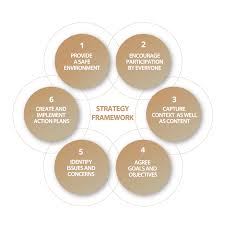Decentralized Decision Making: Empowering Individuals and Enhancing Collaboration
In traditional hierarchical organizations, decision making is often concentrated at the top, with a few individuals holding the power to determine the course of action for the entire organization. However, in recent years, there has been a growing recognition of the benefits of decentralized decision making.
Decentralized decision making refers to a system where decision-making authority is distributed across various levels or individuals within an organization. Instead of relying solely on top-down directives, it empowers individuals at all levels to make decisions that are relevant to their roles and responsibilities. This approach not only fosters a sense of ownership and autonomy but also brings several advantages to organizations.
One significant advantage of decentralized decision making is increased agility. By distributing decision-making authority, organizations can respond more quickly to changing circumstances and adapt their strategies accordingly. Rather than waiting for instructions from higher-ups, teams can take prompt action based on their expertise and knowledge of the situation on the ground. This enables organizations to navigate complex and dynamic environments with greater speed and efficiency.
Moreover, decentralized decision making encourages innovation and creativity within an organization. When individuals have the freedom to make decisions within their area of expertise, they are more likely to come up with new ideas and solutions. By tapping into the collective intelligence of its members, an organization can harness a diverse range of perspectives and insights that can lead to breakthrough innovations.
Decentralized decision making also promotes employee engagement and satisfaction. When individuals are entrusted with decision-making authority, they feel valued and empowered in their roles. This sense of ownership motivates them to contribute more actively towards achieving organizational goals. As a result, organizations experience higher levels of employee morale, productivity, and retention.
Furthermore, decentralized decision making facilitates collaboration among team members. When decisions are made collectively or by those closest to the issue at hand, it encourages open communication and collaboration among team members. Instead of relying solely on top-down directives, teams can engage in meaningful discussions, share ideas, and collectively arrive at decisions that best serve the organization’s objectives. This collaborative environment fosters a sense of teamwork and strengthens relationships within the organization.
However, it is important to note that decentralized decision making does not mean complete absence of oversight or control. Clear guidelines, communication channels, and accountability mechanisms must be established to ensure alignment with organizational goals and values. Effective communication and coordination are crucial to ensure that decentralized decision making does not lead to fragmentation or conflicting actions.
In conclusion, decentralized decision making offers numerous benefits for organizations. It empowers individuals, enhances agility, fosters innovation, promotes employee engagement, and facilitates collaboration. By distributing decision-making authority across various levels or individuals within an organization, organizations can tap into the collective intelligence of their members and adapt more effectively to dynamic environments. Embracing decentralized decision making can be a transformative step towards building more responsive and resilient organizations in today’s fast-paced world.
Effective Strategies for Decentralized Decision Making: 5 Key Tips
- Establish clear roles and responsibilities for decision-makers.
- Develop a process for making decisions that allows input from all stakeholders.
- Encourage open communication and collaboration between stakeholders when making decisions.
- Ensure that all stakeholders have access to the same information when making decisions.
- Monitor the progress of decentralized decision-making to ensure it is effective and efficient in achieving desired outcomes.
Establish clear roles and responsibilities for decision-makers.
Establishing Clear Roles and Responsibilities: Key to Successful Decentralized Decision Making
In the realm of decentralized decision making, one crucial tip for success is to establish clear roles and responsibilities for decision-makers. When decision-making authority is distributed across individuals or teams, it becomes essential to define who has the responsibility for making specific decisions. This clarity ensures that everyone understands their role, minimizes confusion, and maximizes the efficiency of the decision-making process.
By clearly defining roles and responsibilities, organizations can avoid duplication of efforts and ensure that decisions are made by those with the necessary expertise. This helps to streamline the decision-making process and enables individuals to focus on their assigned areas of responsibility. When each person knows their role in the decision-making framework, it enhances accountability and prevents gaps or overlaps in decision-making.
Furthermore, clear roles and responsibilities foster a sense of ownership among decision-makers. When individuals understand that they have been entrusted with specific decisions, they are more likely to take their responsibilities seriously. This ownership mindset encourages proactive engagement in gathering information, analyzing options, and making well-informed decisions within their designated areas.
Establishing clear roles and responsibilities also facilitates effective communication within decentralized decision-making structures. When everyone knows who is responsible for what, it becomes easier to seek input or collaborate with the relevant individuals. It promotes efficient information flow as team members can direct queries or seek guidance from the appropriate decision-makers without unnecessary delays or confusion.
Additionally, clear roles and responsibilities contribute to building trust among team members. When people know their colleagues’ areas of expertise and understand that they are accountable for specific decisions, it fosters confidence in each other’s abilities. Trust is an essential ingredient for successful collaboration within decentralized decision-making systems.
To establish clear roles and responsibilities effectively, organizations should engage in open dialogue with all stakeholders involved in the decision-making process. This includes identifying key positions or teams responsible for specific domains or functions within the organization. Clearly defining these roles, along with the associated decision-making authority and scope, ensures that everyone is on the same page and understands their contribution to the overall decision-making framework.
Regular communication and periodic review of roles and responsibilities are crucial to adapt to evolving organizational needs. As circumstances change, new roles may emerge or existing ones may need adjustment. By regularly reassessing and refining these roles, organizations can ensure that they remain aligned with their goals and objectives.
In conclusion, establishing clear roles and responsibilities is a vital tip for successful decentralized decision making. It brings clarity, accountability, efficiency, trust, and effective communication to the decision-making process. By defining who has responsibility for specific decisions within an organization, teams can work collaboratively while leveraging individual expertise. Embracing this tip paves the way for smoother and more effective decentralized decision making within any organization.
Develop a process for making decisions that allows input from all stakeholders.
Developing a Process for Decentralized Decision Making: Harnessing the Power of Stakeholder Input
In the realm of decentralized decision making, one valuable tip stands out: developing a process that allows input from all stakeholders. By involving individuals at various levels and roles within an organization, this approach ensures that decisions are made with a comprehensive understanding of different perspectives and expertise.
When designing a decision-making process that incorporates stakeholder input, it is essential to establish clear guidelines and channels for communication. This may involve creating forums for open discussions, conducting surveys or interviews, or implementing feedback mechanisms. The goal is to create an inclusive environment where every stakeholder has the opportunity to contribute their insights and opinions.
By actively seeking input from all stakeholders, organizations can benefit in several ways. First and foremost, it leads to more well-rounded decisions. Each stakeholder brings their unique knowledge and experiences to the table, which can shed light on potential blind spots or untapped opportunities. This collaborative approach helps ensure that decisions are not solely based on a single perspective but are instead informed by a diverse range of viewpoints.
Involving stakeholders in the decision-making process also fosters a sense of ownership and commitment. When individuals feel that their voices are heard and their opinions matter, they become more invested in the outcome. This sense of empowerment can boost morale and motivation among team members, leading to increased engagement and productivity.
Furthermore, incorporating stakeholder input promotes transparency within an organization. When decision-making processes are open and inclusive, it builds trust among team members. Stakeholders feel valued and respected when their opinions are considered, even if the final decision may not align with their individual preferences. This transparency helps cultivate a culture of collaboration and mutual respect within the organization.
However, it is important to strike a balance between inclusivity and efficiency when involving stakeholders in decision making. While seeking input from all stakeholders is valuable, organizations must also ensure that the decision-making process remains streamlined and timely. Establishing clear timelines, setting priorities, and defining decision-making roles can help prevent delays or confusion.
In conclusion, developing a process for making decentralized decisions that allows input from all stakeholders is a powerful tool for organizations. By actively involving individuals at various levels and roles, organizations can tap into the collective wisdom of their teams, leading to more well-rounded decisions. This approach not only promotes transparency and ownership but also fosters a culture of collaboration and engagement. Embracing stakeholder input in decision making is a step towards building stronger, more inclusive organizations that harness the diverse perspectives of their members.
Encourage open communication and collaboration between stakeholders when making decisions.
Encouraging Open Communication and Collaboration: Key to Successful Decentralized Decision Making
When it comes to decentralized decision making, one crucial tip stands out: encourage open communication and collaboration between stakeholders. In a decentralized system, where decision-making authority is distributed across different individuals or teams, fostering effective communication and collaboration becomes paramount.
Open communication plays a vital role in ensuring that all relevant stakeholders are involved in the decision-making process. By creating an environment where everyone feels comfortable expressing their opinions, ideas, and concerns, organizations can tap into a diverse range of perspectives. This inclusivity helps to generate well-rounded decisions that consider various viewpoints and potential implications.
When stakeholders are encouraged to collaborate, it brings together different expertise and experiences. Collaboration allows individuals to pool their knowledge and skills, leading to more informed decisions. By leveraging the collective intelligence of the team, organizations can benefit from innovative ideas and creative problem-solving approaches that may not have been possible through individual decision making.
Moreover, open communication and collaboration foster transparency within the organization. When stakeholders have access to information about the decision-making process, they gain a deeper understanding of the rationale behind decisions. This transparency builds trust among team members and ensures that everyone is aligned with organizational goals.
To encourage open communication and collaboration in decentralized decision making, organizations can implement several strategies. First and foremost is establishing clear channels for sharing information and ideas. This could be through regular team meetings, collaborative platforms or tools, or even dedicated brainstorming sessions. By providing opportunities for dialogue, organizations enable stakeholders to voice their thoughts openly.
Another important aspect is active listening. Encouraging stakeholders to actively listen to one another promotes understanding and empathy within the group. When individuals feel heard and understood, they are more likely to contribute constructively to the decision-making process.
Additionally, organizations should create a culture that values diverse perspectives. Recognizing that each stakeholder brings unique insights based on their background or expertise fosters an environment where everyone’s input is valued. This appreciation for diversity encourages individuals to contribute their ideas without fear of judgment or dismissal.
Lastly, it is essential to establish clear decision-making processes and roles. Clearly defining who is responsible for making final decisions and how input from stakeholders will be considered helps streamline the decision-making process. This clarity ensures that decisions are made efficiently while still benefiting from the collective wisdom of the team.
In conclusion, encouraging open communication and collaboration between stakeholders is a crucial tip for successful decentralized decision making. By creating an inclusive environment where all voices are heard, organizations can harness the power of diverse perspectives, foster transparency, and make well-informed decisions. Embracing this tip not only enhances the quality of decisions but also strengthens relationships and promotes a culture of teamwork within the organization.
Ensure that all stakeholders have access to the same information when making decisions.
When it comes to decentralized decision making, one crucial tip is to ensure that all stakeholders have access to the same information. In a decentralized decision-making system, where authority is distributed across various levels or individuals, it is essential that everyone involved has access to accurate and relevant information.
Why is this important? When stakeholders have access to the same information, it promotes transparency and fairness in the decision-making process. It ensures that decisions are made based on a shared understanding of the facts and eliminates potential biases or misunderstandings that may arise from incomplete or inconsistent information.
By providing equal access to information, organizations can foster a collaborative environment where individuals can engage in informed discussions and contribute their unique perspectives. It encourages open communication and allows for a more comprehensive evaluation of options and potential outcomes.
Additionally, when all stakeholders have access to the same information, it helps build trust among team members. Transparency in decision making demonstrates respect for each individual’s contribution and builds confidence in the process. When people feel included and informed, they are more likely to be invested in the decisions made and committed to their successful implementation.
To ensure equal access to information, organizations can implement various strategies. This may include establishing centralized repositories or platforms where relevant data, reports, and updates are accessible by all stakeholders. Regular communication channels should be established to disseminate information promptly and efficiently.
It is also crucial to ensure that the shared information is clear, concise, and easily understandable for everyone involved. Avoid using jargon or technical language that may alienate certain stakeholders. Presenting complex data in a user-friendly manner can help facilitate better comprehension and engagement from all parties.
In conclusion, ensuring that all stakeholders have access to the same information is a fundamental aspect of decentralized decision making. By promoting transparency, fairness, collaboration, and trust within an organization, this practice enhances the quality of decisions made collectively. When everyone has equal access to relevant information, organizations can leverage diverse perspectives effectively and achieve better outcomes.
Monitor the progress of decentralized decision-making to ensure it is effective and efficient in achieving desired outcomes.
Monitoring the Progress of Decentralized Decision Making: Ensuring Effectiveness and Efficiency
Decentralized decision making can be a powerful approach to empower individuals, promote collaboration, and enhance organizational agility. However, it is essential to monitor the progress of decentralized decision-making to ensure that it is effective and efficient in achieving the desired outcomes.
Monitoring serves as a vital tool for organizations to assess the impact of decentralized decision making on their overall performance. By regularly evaluating the outcomes and processes associated with decentralized decision making, organizations can identify areas of success and areas that may require improvement.
One key aspect of monitoring decentralized decision making is tracking the effectiveness of decisions made at various levels within the organization. This involves assessing whether decisions align with organizational goals, are based on accurate information, and yield positive results. By analyzing the outcomes of decentralized decisions, organizations can identify patterns, trends, or potential bottlenecks that may need attention.
Efficiency is another crucial factor to consider when monitoring decentralized decision making. It involves evaluating how efficiently decisions are made and implemented across different levels or individuals within the organization. This includes assessing factors such as timeliness, resource allocation, communication effectiveness, and coordination among teams. Monitoring efficiency helps organizations identify any inefficiencies or barriers that may hinder the successful implementation of decentralized decision making.
Regular feedback mechanisms are essential for effective monitoring. Encouraging open communication channels allows individuals involved in decentralized decision making to provide insights on their experiences, challenges faced, and suggestions for improvement. Feedback can be collected through surveys, interviews, or regular check-ins to gain valuable perspectives from those directly engaged in the decision-making process.
Monitoring should also involve periodic reviews of established guidelines and accountability mechanisms associated with decentralized decision making. Are these guidelines still relevant? Do they provide sufficient clarity? Are there any gaps or inconsistencies? Regularly reviewing these aspects ensures that the framework supporting decentralized decision making remains robust and aligned with organizational objectives.
In conclusion, monitoring the progress of decentralized decision making is vital to ensure its effectiveness and efficiency in achieving desired outcomes. By tracking the effectiveness of decisions, evaluating efficiency, and seeking feedback from individuals involved, organizations can identify areas for improvement and make necessary adjustments. Continuous monitoring enables organizations to optimize the benefits of decentralized decision making while addressing any challenges that may arise along the way.




